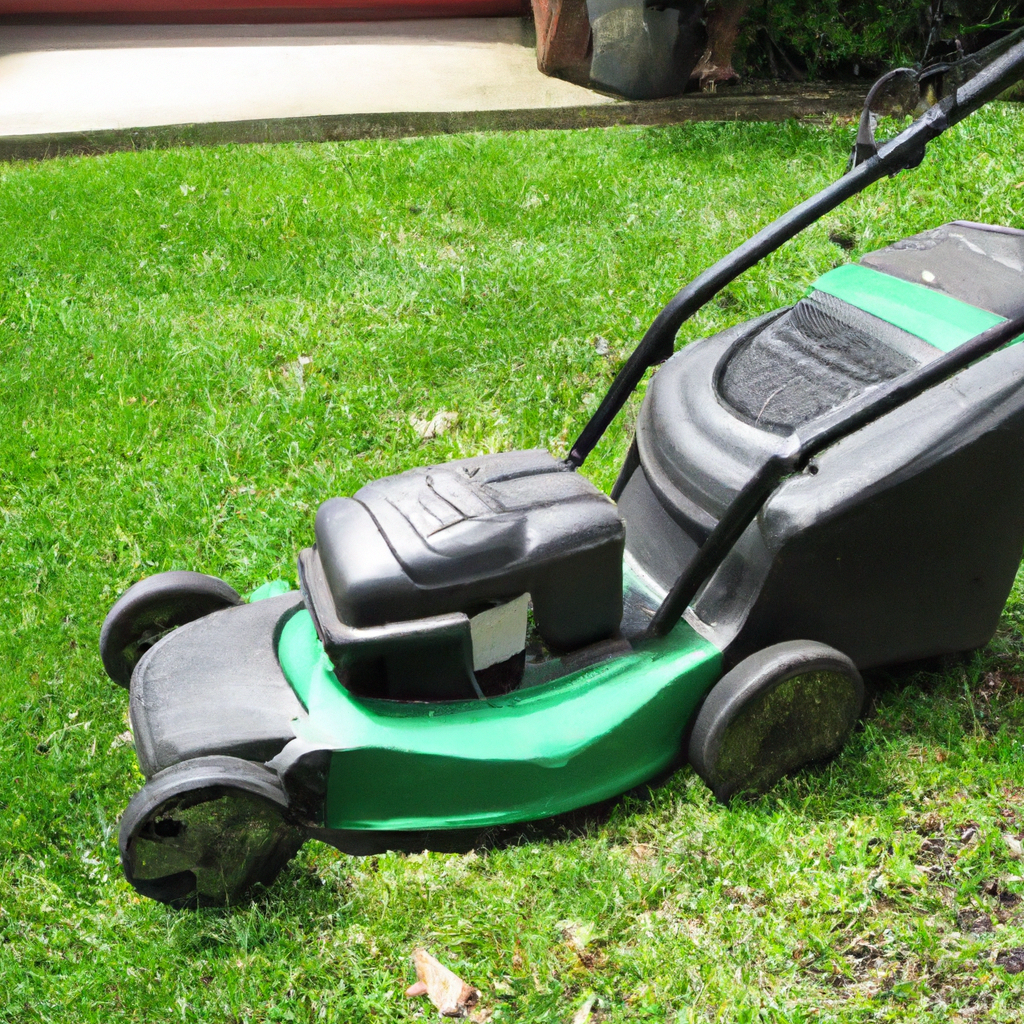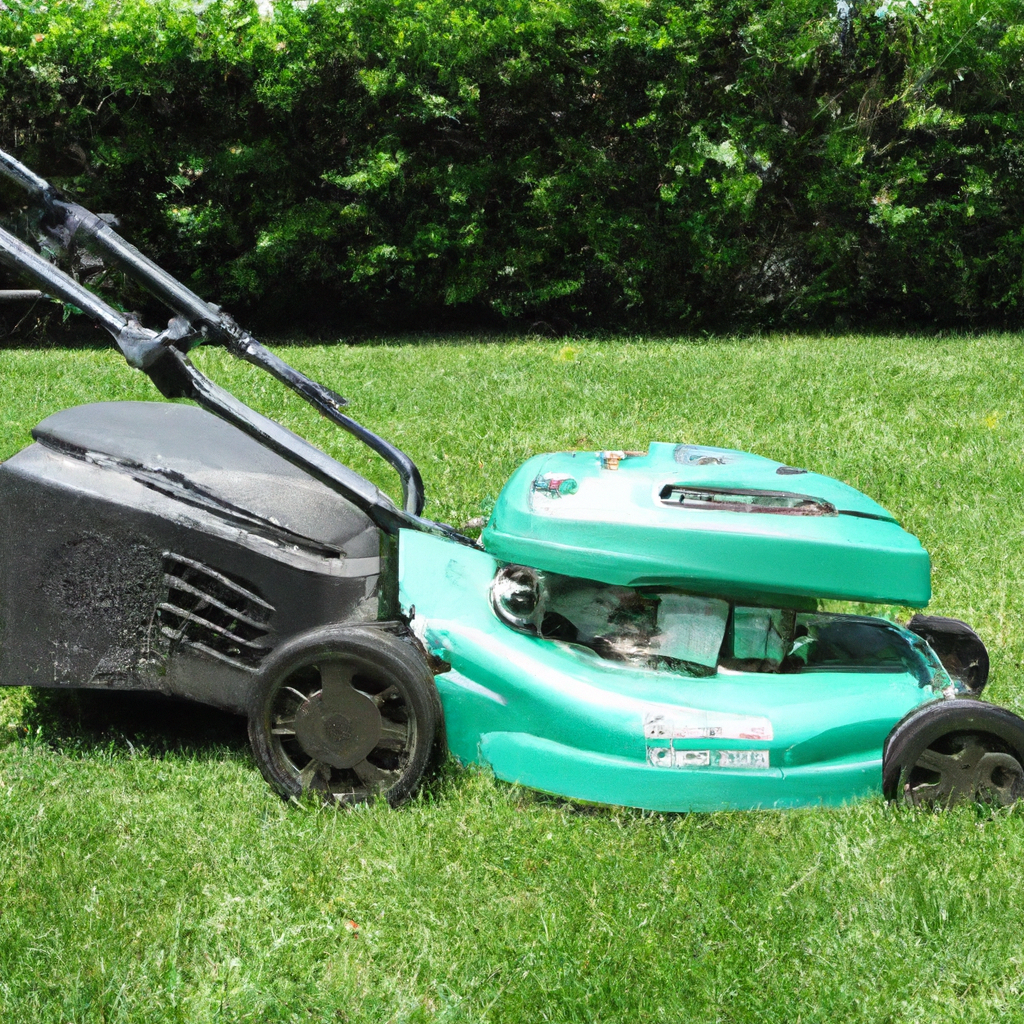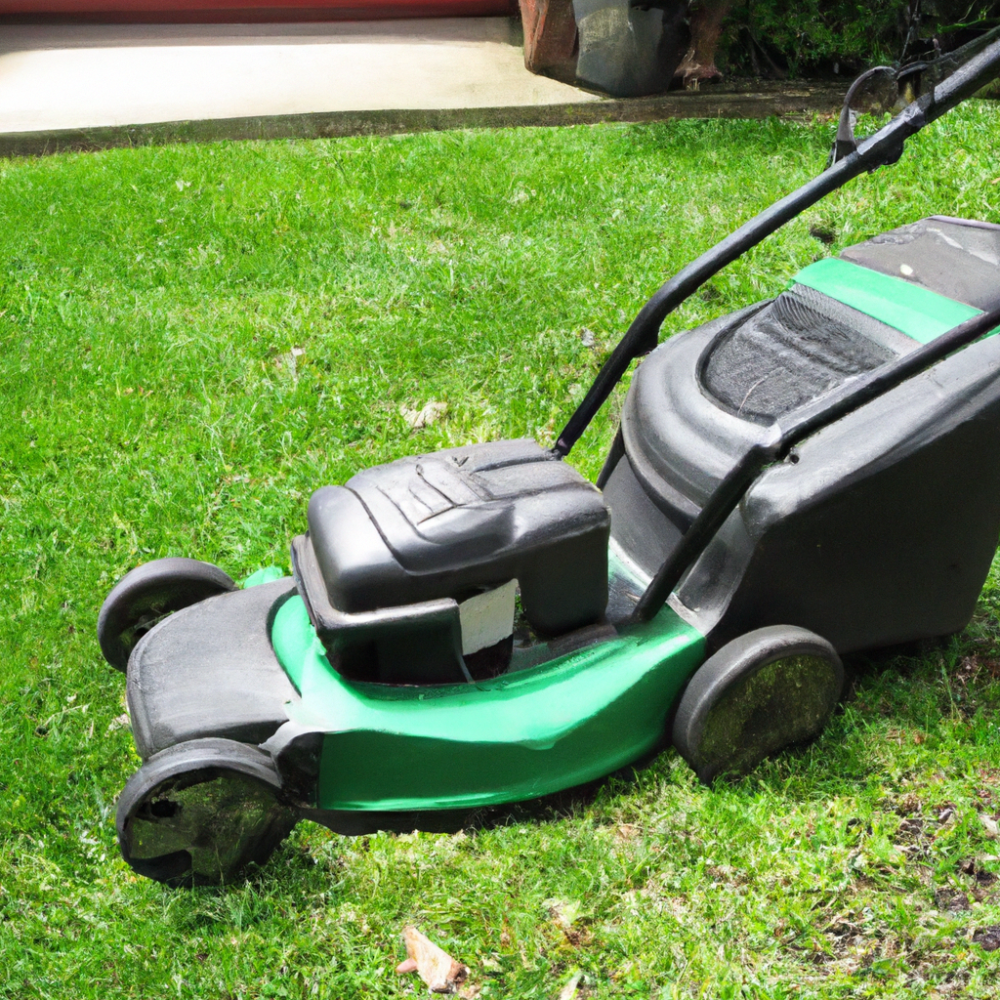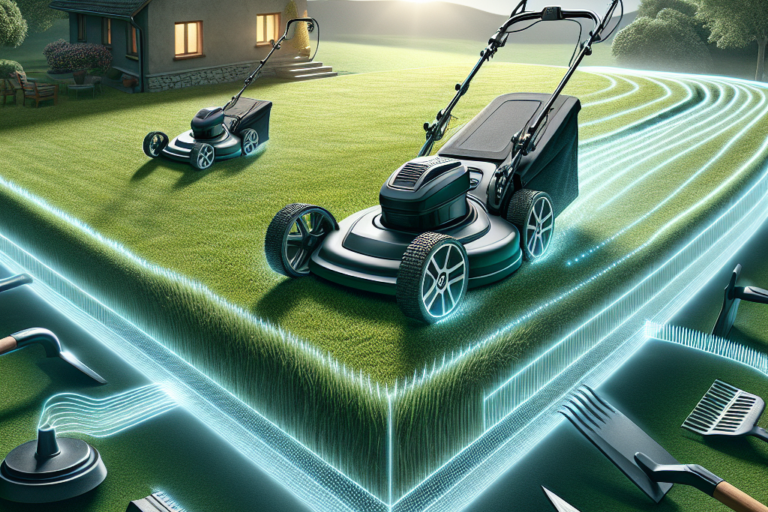Have you ever wondered about the weight of an electric lawn mower? Well, look no further! In this article, we will explore the typical weight of an electric lawn mower, providing you with all the information you need to make an informed decision. Whether you’re a gardening enthusiast or a first-time buyer, understanding the weight of this essential tool will help you choose the right one for your needs. So, let’s dive in and discover the typical weight of an electric lawn mower!

Factors Affecting the Weight of Electric Lawn Mowers
When it comes to electric lawn mowers, there are several factors that can affect their weight. Understanding these factors is important when choosing the right electric lawn mower for your needs. Here are some key factors that influence the weight of electric lawn mowers:
Motor Power and Size
The motor power and size of an electric lawn mower play a crucial role in determining its weight. Generally, higher motor power and larger motor size will result in a heavier mower. This is because a more powerful motor requires more components and materials, which ultimately adds to the overall weight of the mower.
Deck Size and Construction
The deck size and construction of an electric lawn mower also contribute to its weight. The deck is the part of the mower that houses the blade and serves as a cutting platform. Larger deck sizes are typically heavier as they require more material to support the larger cutting area. Additionally, the construction of the deck, such as the type of material used, can also impact the weight. For example, a mower with a steel deck will generally be heavier than one with a plastic deck.
Battery Type and Capacity
The type and capacity of the battery used in an electric lawn mower can significantly affect its weight. Different electric lawn mowers use different types of batteries, such as lithium-ion or lead-acid batteries. Lithium-ion batteries are generally lighter compared to lead-acid batteries, which can add significant weight to the mower. Furthermore, mowers with higher battery capacities will have larger and heavier batteries, thus increasing their overall weight.
Additional Features
The inclusion of additional features in electric lawn mowers can influence their weight. Some mowers come with features like self-propulsion, rear bagging capabilities, or mulching functions. While these features can enhance the performance and convenience of the mower, they can also add to its weight. It’s important to consider whether these additional features are necessary for your specific needs and whether the added weight is worth the benefits they provide.
Weight Ranges of Electric Lawn Mowers
Electric lawn mowers can be categorized into different weight ranges based on their overall weight. Knowing these weight ranges can help you narrow down your choices and find the best electric lawn mower for your specific requirements. Here are the typical weight ranges for electric lawn mowers:
Lightweight Electric Lawn Mowers (Under 50 pounds)
Lightweight electric lawn mowers are perfect for those who prioritize maneuverability and ease of use. These mowers are typically designed to be compact and lightweight, making them suitable for small lawns or for users who may have difficulty lifting heavier equipment. The lightweight nature of these mowers also allows for easy storage and transportation. However, it’s important to note that some lightweight models may sacrifice certain features or cutting power to achieve their reduced weight.
Mid-weight Electric Lawn Mowers (50-75 pounds)
Mid-weight electric lawn mowers strike a balance between maneuverability and cutting capability. They are suitable for medium-sized lawns and offer a good compromise between weight and performance. These mowers often come with a range of features and are sturdy enough to handle more demanding tasks. The increased weight compared to lightweight models often translates to improved durability and stability during operation.
Heavyweight Electric Lawn Mowers (75 pounds and above)
Heavyweight electric lawn mowers are designed for larger lawns and tougher grass conditions. These mowers are robust and built to withstand heavy use. They often have more powerful motors, larger cutting decks, and increased battery capacity, making them suitable for extensive lawn care needs. However, their weight makes them less maneuverable and may require more strength to handle effectively. It’s important to consider whether the additional features and capabilities outweigh the limitations of their weight.
Advantages and Disadvantages of Different Weight Ranges
Each weight range of electric lawn mowers has its own unique advantages and disadvantages. Understanding these pros and cons can help you make an informed decision when choosing the right electric lawn mower for your specific needs.
Advantages of Lightweight Electric Lawn Mowers
- Maneuverability: The lightweight nature of these mowers makes them highly maneuverable, allowing you to easily navigate around obstacles and tight spaces in your lawn.
- Easy Storage and Transportation: Due to their reduced weight, lightweight electric lawn mowers are easier to store and transport, making them ideal for users with limited space or those who frequently need to move their mower between locations.
- Suitable for Small Lawns: If you have a small lawn, a lightweight electric mower may be the perfect choice. Their compact size and lightweight design make them efficient for smaller mowing areas.
Disadvantages of Lightweight Electric Lawn Mowers
- Limited Cutting Power: Lightweight electric mowers often sacrifice cutting power due to their reduced size and weight. They may struggle with thick or overgrown grass, resulting in less-than-desirable cutting performance.
- Less Durable: While lightweight mowers are typically designed to be durable, they may not withstand heavy or frequent use as well as heavier models. The construction materials used may not be as robust, which can impact their longevity.
Advantages of Mid-weight Electric Lawn Mowers
- Balanced Performance: Mid-weight electric lawn mowers offer a good balance between maneuverability and cutting power. They are suitable for medium-sized lawns and can handle different grass conditions effectively.
- Improved Durability: Mid-weight models often have sturdier construction and components, making them more durable and able to withstand regular use.
- A Wide Range of Features: Many mid-weight electric mowers come equipped with various features to enhance usability and cutting performance. These features may include adjustable cutting heights, mulching capabilities, or bagging options.
Disadvantages of Mid-weight Electric Lawn Mowers
- Moderate Maneuverability: While mid-weight mowers are generally maneuverable, they may not be as agile as lightweight models when navigating tight spaces or intricate lawn layouts.
- Weight Considerations: If you have limited strength or mobility, the weight of mid-weight electric mowers may pose a challenge. They require more effort to lift and maneuver compared to their lightweight counterparts.
Advantages of Heavyweight Electric Lawn Mowers
- Powerful Performance: Heavyweight electric mowers typically come with higher motor power, larger cutting decks, and increased battery capacity. This combination allows them to tackle tough grass conditions and handle larger lawns with ease.
- Enhanced Durability: Due to their sturdier construction, heavyweight mowers are often built to withstand demanding use and provide long-lasting performance.
- Versatility: Many heavyweight models offer a wide range of features and cutting options, allowing you to adapt to different mowing needs and achieve professional-level results.
Disadvantages of Heavyweight Electric Lawn Mowers
- Limited Maneuverability: The weight of heavyweight mowers can make them more challenging to maneuver around obstacles and narrow spaces. Their bulkiness may require more effort and precision during operation.
- Storage and Transportation Difficulties: Heavyweight electric mowers can be cumbersome to store and transport, especially if you have limited space or need to frequently move the mower.
Considerations when Choosing the Weight of an Electric Lawn Mower
When choosing the weight of an electric lawn mower, it’s important to consider several factors that may impact your overall mowing experience. Here are some key considerations to keep in mind:
Lawn Size and Terrain
The size of your lawn and its terrain should be taken into account when selecting an electric lawn mower. Smaller lawns with flat terrain may be best suited for lightweight mowers, while larger lawns with uneven or hilly terrain may require the added power and stability of a heavier model.
User Strength and Mobility
Consider your own strength and mobility when choosing the weight of an electric lawn mower. If you have limited physical strength or mobility issues, a lightweight or mid-weight mower may be more suitable. However, if you have no restrictions and can comfortably handle heavier equipment, a heavyweight mower may provide the necessary power and performance.
Storage and Transportation
Think about where and how you will store your electric lawn mower when it’s not in use. If storage space is limited or if you need to frequently transport the mower, a lightweight or mid-weight model may be more practical. Heavyweight mowers may require dedicated storage spaces and more effort to transport.
Budget and Cost
Different weight ranges of electric lawn mowers come at varying price points. Consider your budget and evaluate the features and capabilities that are most important to you. It’s important to find a balance between cost and the features you require, rather than solely focusing on the weight of the mower.
Noise and Vibration
While not directly related to weight, it’s worth considering the noise and vibration levels produced by an electric lawn mower. Some lightweight models may produce more noise or vibrations compared to their heavier counterparts. If noise levels or vibrations are a concern for you or your neighbors, choose a mower that is designed to minimize these factors.

Tips for Maneuvering and Operating Electric Lawn Mowers
Regardless of the weight of your electric lawn mower, there are several tips and techniques that can help you maneuver and operate the mower efficiently and safely. Here are some useful tips to consider:
Proper Lifting and Carrying Techniques
When lifting and carrying your electric mower, it’s important to use proper techniques to avoid strain or injury. Bend your knees, keep your back straight, and lift with your leg muscles, rather than your back. Use both hands to maintain a balanced grip on the mower, and avoid lifting beyond your comfort level.
Adjusting Deck Height and Cutting Height
Adjusting the deck height and cutting height of your mower is crucial for achieving the desired grass length. Familiarize yourself with the mower’s features and settings, and make the necessary adjustments based on the condition of your lawn. Follow the manufacturer’s instructions for proper adjustment to ensure the best cutting performance.
Avoiding Overloading and Overheating
To prevent overloading and overheating, avoid cutting too much grass at once. Cutting in small, manageable sections allows the mower to work efficiently and prevents strain on the motor and battery. This is especially important for lightweight or mid-weight mowers with limited cutting power.
Regular Maintenance and Cleaning
Proper maintenance and regular cleaning are essential for keeping your electric lawn mower in optimal condition. Follow the manufacturer’s instructions for maintenance tasks such as blade sharpening, oiling, and filter cleaning. Regularly remove grass clippings and debris from the mower to prevent clogging and ensure consistent cutting performance.
Safety Precautions for Safe Operation
Always prioritize safety when operating your electric lawn mower. Wear appropriate safety gear such as goggles, gloves, and closed-toe shoes to protect yourself from flying debris. Ensure that the mower is turned off and unplugged when performing maintenance or making any adjustments. Familiarize yourself with the mower’s safety features, such as the blade stop function, and use them as instructed.
Innovations in Lightweight and Compact Electric Lawn Mowers
Advancements in technology have led to numerous innovations in lightweight and compact electric lawn mowers. These innovations aim to provide users with improved performance, portability, and ease of use. Here are some notable advancements in this category:
Advancements in Lithium-ion Battery Technology
Lithium-ion battery technology has revolutionized the landscape of electric lawn mowers. These batteries offer higher energy density, longer runtimes, and faster charging compared to traditional lead-acid batteries. As a result, manufacturers have been able to design lightweight mowers with improved cutting power and extended battery life. Lithium-ion batteries also have a lower self-discharge rate, meaning they retain their charge for longer periods when not in use.
Design and Material Innovations
Design and material innovations have led to the creation of lightweight and durable electric lawn mowers. Manufacturers are utilizing lightweight yet robust materials in their construction, such as high-performance plastics and aluminum alloys. These materials reduce the overall weight of the mower while maintaining strength and durability. Additionally, ergonomic designs are being implemented to enhance user comfort and ease of operation.
Foldable and Compact Models
Foldable and compact models have become increasingly popular among homeowners with limited storage space. These mowers feature collapsible handles and chassis, allowing them to be easily stored in small spaces such as garages or sheds. Foldable models are also convenient for transportation, as they can fit into compact vehicles or even be carried by hand.
In conclusion, the weight of an electric lawn mower is influenced by several factors, such as motor power, deck size, battery type, and additional features. Understanding the different weight ranges and their advantages and disadvantages is crucial in selecting the right mower for your needs. Considerations like lawn size, user strength, storage requirements, budget, and noise levels should also be taken into account. By following proper maneuvering techniques and staying up-to-date with the latest innovations, you can enjoy the benefits of a well-maintained lawn with an electric mower that suits your preferences.






